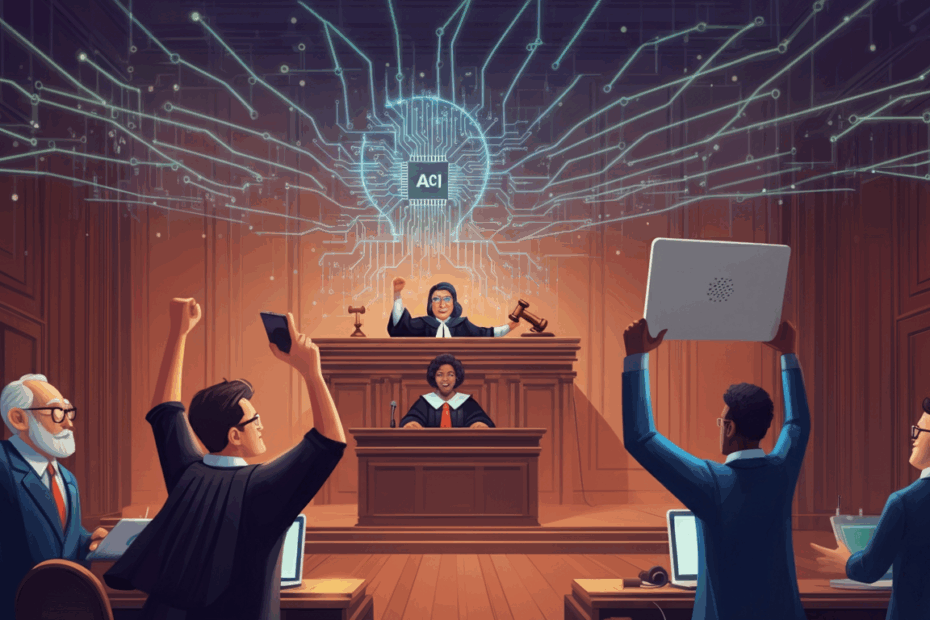A New Bill Could Change How AI Learns from Our Work
Hello everyone, and welcome back to the blog! It’s your friend, John, here to break down the latest in the world of AI. Today, we’re looking at some big news coming out of the United States that could change the rules for how AI models are built. It’s all about a new bill that’s been proposed, and it touches on a really important topic: permission.
As always, my wonderful assistant Lila is here to help us keep things simple and clear.
Hi, everyone! I’m ready to ask the questions we’re all thinking.
Perfect! Let’s dive in.
What’s This New Bill All About?
Imagine you’re a baker who makes amazing, unique cakes. Now, imagine a huge factory wants to learn all your secret recipes to make their own cakes. They don’t ask you; they just sneak a peek at your recipe book while you’re not looking. You wouldn’t think that’s very fair, right?
Well, a similar situation is happening in the digital world. A pair of US Senators have introduced a new bill to address this. They come from different political parties but are working together on this, which shows it’s a topic many people are concerned about.
Lila: Wait, John, what does it mean when you say they are from different political parties? The article called it ‘bipartisan’.
Great question, Lila! In the U.S. government, there are two main political groups, or parties. ‘Bipartisan’ is just a fancy word that means both of these groups are supporting the same idea. It suggests that this isn’t a one-sided issue; lawmakers from across the aisle agree that it’s something important that needs to be looked at.
The main goal of this bill is simple: to make sure that AI companies have to ask for permission before using someone’s creative work to train their AI systems.
Protecting Everyone’s Creative Work
So, what kind of work are we talking about? The bill is designed to protect copyrighted content.
Lila: Okay, that sounds official. What exactly is ‘copyrighted content’? Is that just stuff from big, famous companies?
That’s a common misconception, Lila, but an important one to clear up. Copyright isn’t just for massive corporations! Think of it this way: when you create something original—whether it’s a photograph you take, a story you write, or even a blog post like this one—you are the owner of that work. That ownership is your ‘copyright’. It’s an automatic right that says, “Hey, this is mine, and you can’t just copy it or use it without my permission.”
This proposed law would protect a huge range of creators, including:
- Large media companies that publish news and books.
- Individual bloggers writing about their hobbies.
- Artists, photographers, and musicians who post their work online.
Basically, if you created it, this bill aims to give you a say in whether or not it can be used to teach an AI.
How Would This Affect Big AI Companies?
Right now, major tech companies build their powerful AI by ‘training’ them. To put it simply, they feed the AI a gigantic amount of information from the internet—text, images, articles, books, and more. It’s like making an AI read a massive library to learn how to talk, write, and reason. The more it reads, the “smarter” it gets.
Companies mentioned in the article that do this include:
- Meta (the company behind Facebook and Instagram)
- OpenAI (the makers of ChatGPT)
- Anthropic (another major AI company)
If this new bill becomes law, these companies couldn’t just “suck up,” as the original article puts it, all this data from the internet anymore. They would have to get permission from the copyright owners first. This could fundamentally change how they gather their training materials.
The Big Debate: Redefining ‘Fair Use’
This is where things get a little technical, but stick with me. The whole debate centers around a legal idea called fair use. If this bill passes, the article says it would “redefine the boundaries of fair use.”
Lila: Whoa, slow down John! You’ve got to explain ‘fair use’. It sounds like a legal maze.
You’re right, Lila, it can be confusing, but here’s a simple way to think about it. ‘Fair use’ is an exception to the copyright rule. It says that in certain special cases, you can use a small part of someone’s copyrighted work without asking. For example, if a movie critic includes a 10-second clip of a film in their video review, that’s often considered fair use. It’s for purposes like criticism, commentary, news reporting, or education.
For a while now, AI companies have argued that using content to train their AI is also a form of fair use. They say they aren’t re-publishing the work, but just using it to learn patterns. This new bill challenges that argument head-on. It suggests that taking entire libraries of creative work to build a commercial AI product is not what ‘fair use’ was intended for. This law would draw a new, much clearer line, stating that AI training is not automatically fair use and requires the creator’s consent.
My Final Thoughts
From my perspective as someone who has watched technology evolve, this is a pivotal moment. It’s a classic case of law catching up with technology. The discussion here is about finding a balance between encouraging incredible innovation in AI and protecting the rights of the human creators who laid the foundation for it.
Lila: As a beginner, it just seems fair. If people’s hard work is being used to build these amazing tools, they should get to say ‘yes’ or ‘no’ first. It feels like common courtesy!
I couldn’t agree more, Lila. We’ll be keeping a close eye on this to see what happens next!
This article is based on the following original source, summarized from the author’s perspective:
AI data-suckers would have to ask permission first under new
bill
